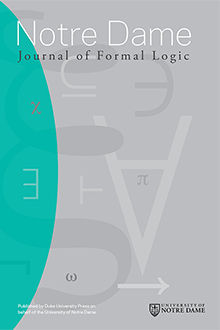Abstract
Disjunctive Syllogism, that is, the inference from 'not-A or B' and 'A', to 'B' can lead from true premises to a false conclusion if each of the sentences 'A' and 'not-A' is a statement of a partial truth such that affirming one of them amounts to denying the other, without each being the contradictory of the other. Such sentences inevitably occur whenever a situation which for its proper precise description needs the use of expressions such as 'most probably true' and so forth, is described (less precisely) by sentences not containing such expressions.
Citation
S. V. Bhave. "Situations in Which Disjunctive Syllogism Can Lead from True Premises to a False Conclusion." Notre Dame J. Formal Logic 38 (3) 398 - 405, Summer 1997. https://doi.org/10.1305/ndjfl/1039700746
Information





